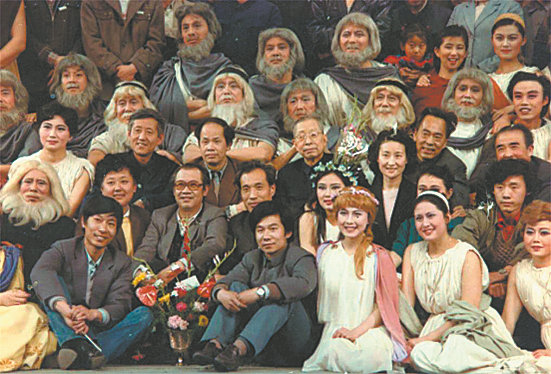

Father, the director
As a child, Luo Jinlin often assisted his father in copying books. However, he wasn't interested in the stories then; he was just motivated by the reward — a popsicle.
"When I joined the Central Academy of Drama, my first class was on Western theatrical history, including Greek drama," he recalls. His teacher for the class was a student of his father. Through studying, he gradually developed a deeper understanding of Greek drama.
In 1985, as Luo Jinlin rehearsed Oedipus Rex, his then 81-year-old father willingly offered to serve as the production's literary adviser. Despite the freezing temperatures, he passionately explained ancient Greek history and the drama to the actors.
The next year, Oedipus Rex premiered at the Central Academy of Drama's experimental theater, marking the Chinese mainland's first performance of an ancient Greek tragedy.
It received wide acclaim from audiences, leaving Luo Niansheng overjoyed. "After 50 years of waiting, I finally see this masterpiece shine on our stage. A dream come true," he wrote.
Oedipus Rex was performed over 20 times. After just its fifth show, the Greek government formally invited the company to perform in Greece. Building on this success, Luo Jinlin directed several other ancient Greek plays translated by his father.
"Ancient Greek dramas are rich in perspectives, and offer deep insights into human nature and society, even after 2,500 years," Luo Jinlin observes.
His dedication to Greek drama aims to showcase its lasting relevance, emphasizing themes of truth, goodness, and beauty, and celebrating humanity.
Plays like The Trojan Women criticize war and champion peace. The Women at the Thesmophoria advocates for gender equality. And Oedipus Rex prompts self-reflection. Luo Jinlin seeks to highlight the contemporary issues and human concerns in the plays.
"For decades, the challenge of my work has been to see if drama from two very different cultures and times can merge. It's about creating a mix, like coffee with milk, where elements of one are found in the other," he explains.
He finds his solution by merging the beauty and techniques of Chinese opera with the drama of ancient Greek plays, creating a blend of two ancient cultures for today's world.
His adaptation of Medea into Hebei Bangzi opera was a huge hit internationally, and was performed over 250 times. It was so popular that it even outshone a performance by the famous Italian opera singer Luciano Pavarotti, which took place on the same street in Milan, with audiences filling the corridors of the theater.
"Foreign audiences really enjoy our plays and often struggle to get tickets. In Colombia, a mother and daughter shared a ticket to see it, one watching the first half, the other the second, showing just how popular it was," Luo Jinlin says.
He explains that Chinese opera's expressive power, with its abstraction and symbolism, displays a rich Asian beauty. Ancient Greek drama, known for its profound themes and solemnity, provides depth and impact. He aims to fuse these qualities, not just mix them, creating a blend where the sum is greater than its parts.
"Drama acts as a mirror to human life. Exploring the interaction and fusion between Eastern and Western theater has been enlightening for me. This journey has shown that different civilizations can coexist in harmony, complement and enrich each other," he explains.
To date, he has directed over 100 productions, including 16 ancient Greek dramas. His work has reached audiences not only in China, but also across Europe, Asia, and Latin America, with over 300 performances worldwide.
In 2009, he was honored as an Ambassador of Greek Culture by the Athens government. Additionally, in January, he received the 9th Huilin Prize for his outstanding contribution to promoting Chinese culture internationally.
Despite being 87 years old, Luo Jinlin shows no signs of slowing down. He starts his day at 5:30 am, writing and teaching with dedication. This year, he plans to publish a comprehensive 300,000-word acting guide and to stage a production of Homer's Odyssey.